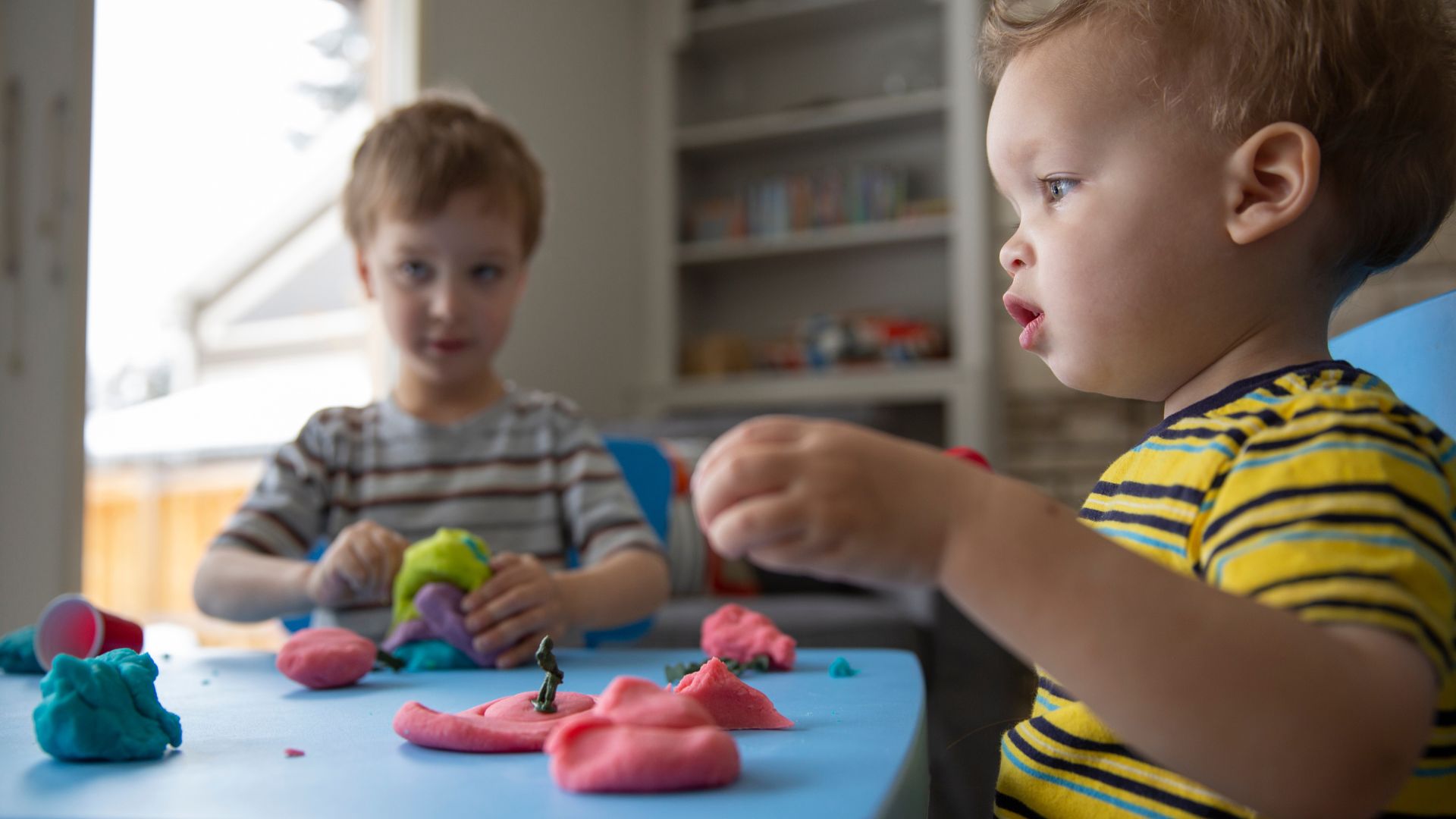
Sensory play means any activity or experience that engages all of a child’s senses of touch, sight, smell, sound, and taste and encourages them to explore the world we live in.
Sensory play is not limited to just babies, it’s really easy to turn games, walks, and even trips to the supermarket into something that will help stimulate your child’s senses. Play expert Amanda Frohlich says sensory play is not only fun and engaging but it also plays a crucial role in a child’s development. “It helps to stimulate brain development, enhances cognitive abilities, and develops fine motor skills. Sensory play can also improve social and emotional skills by encouraging communication, sharing, and cooperation,” she explains.
There is a huge range of sensory toys on the market - but children will also be happy playing and experimenting with things you might already have at home such as shaving foam, cooked spaghetti, or ice cubes.
Gemma Berg, from Peekaboo Learning, says sensory play can also be really beneficial for children with additional needs and ADHD or autism, for example. “Sensory play can be used for both learning in a loud environment, and in addition also be used when children might need some quieter time in a sensory room, which many schools have designated to help,” she explains. Sensory play more often than not can look like 'kids making a mess', but we promise there are benefits to that - we asked the experts...
Benefits of sensory play
There are nine benefits of sensory play, it supports your child’s mental and physical development and helps them build friendships and connections too. So in other words, the mess is worth it. Clair Turner, co-founder of My Playroom UK, says: “When you open up the world of sensory play you’re giving a child a wealth of skills that will enable them to complete more complex daily tasks. Exploring and learning this way helps children learn the difference between hard and soft, hot and cold, loud and quiet, rough and smooth, and many other senses.” In addition to this, lots of experts share key benefits of sensory play.
1. Develops fine motor skills
Parenting expert Kirsty Ketley says: “Sensory play is great for helping children strengthen their fine and gross motor skills, through manipulating dough, lifting, spooning, pouring, transferring.” These actions will help your child strengthen the smaller muscle groups and develop their coordination.
The activities can be started as soon as your baby is sitting independently. You can fill a tub or tray with different textures and guide their hands through it and let them explore. High chair trays are also a good place to introduce some sensory play. Let them pick up and play with foods that have different textures, tastes, and smells. Just remember to never leave babies unattended with anything which could be a choking hazard.
2. Teaches cause and effect
This is a really important benefit of sensory play because it helps infants make sense of the world. By playing with sensory toys they will see how their actions have an impact. With a very young baby this could be shaking a toy which makes a noise. For an older child it could be popping a bubble with their finger or building a stack of blocks and then knocking it down.
Water play in the garden or in the bath is also a really great way of learning cause and effect. You can use different jugs or cups to pour water from one to the other. Gentle splashing of warm water can also get a baby used to the sensation of it on their skin and faces.
3. Builds problem solving skills
Gemma Berg says sensory play can help build children’s resilience because they can learn through explorative play that if their initial plan didn’t work, they don’t have to give up. This means they start to understand that there is another way to achieve their goal. She also suggests that “if your child is reluctant to play, you can help them by sitting next to them and modeling how fun it can be”. You can reassure them that if things go wrong, you can just try again.
4. Aids brain development
Child psychologist Dr Amanda Gummer, who has developed The Good Play Guide, says sensory play is beneficial because it contributes to the development of children’s brains and nervous systems. “Sensory play helps to build connections between neurons in the brain, which strengthens neural pathways and improves cognitive skills such as problem-solving, decision-making, and creativity. Additionally, sensory play can help toddlers to regulate their emotions and develop their social skills,” she explains.
5. Supports language development
Sensory play can be a great way for children to expand their vocabulary and learn how to express their emotions. Dr Gummer says children will learn new words and concepts as they play and interact with others. “Sensory play also encourages toddlers to use language to express their thoughts and feelings, as well as to communicate with others,” she says.

You can ask toddlers to describe how things feel - “Is it squishy or slimy or smooth?” Encourage the use of action words and descriptive words when asking questions. Sensory play can also develop children’s imaginations and they may start to make up scenarios and stories as they play.
The most important thing is to speak to your child while you’re playing. It might be a while before a baby says their first words but a newborn’s hearing is fully developed at birth. Talking to them about colours, shapes and textures will only help build on their language when they do start to talk.
6. Develops independent play and thinking
One thing which might make sensory play even more popular with parents is that children can enjoy it on their own. While it’s important to make sure they are playing in safe surroundings with no hazards, it’s something they can get stuck into independently. Keep a ‘treasure’ basket filled with toys such as instruments, scarfs, stacking blocks or squishy books for them to explore at home. They’ll be so busy you might even get to drink a hot cup of tea!
Sensory play also promotes independent thinking, even in very young children. Dr Gummer says: “Through sensory experiences, toddlers learn to make decisions, develop hypotheses, and test their ideas. This type of play also promotes creativity and imagination, as toddlers are free to explore their surroundings and come up with their own ideas and solutions. “As toddlers engage in sensory play, they learn to become more self-directed and confident in their abilities, which supports independent play and thinking,” she adds.
7. Aids emotional development and calm feelings
Amanda Frohlich, who runs Amanda’s Action Club children’s classes, says sensory play can help children manage their feelings and emotions by improving their self-regulation and making them more aware of their own sensory needs. “Some children find sensory play comforting and quietening, which can be helpful for those who struggle with anxiety or sensory processing issues, it can focus a busy mind, and many resources reduce feelings of overwhelm.”
Soothing textures smells, and sounds can really settle a child if they struggle with anger, restlessness, or frustration. There may be a certain type of sensory play that they find helps them stay calm. Kirsty says it can also be a good way for a child to unwind after a day at school or nursery.
Many educational settings now have sensory rooms where children can go for a break if they find the school environment noisy or overwhelming. Music, white noise, or sounds such as rain or the ocean can be helpful for children who feel overstimulated in loud situations.
8. Supports children with additional needs or disabilities
Frohlich says sensory play can help children with ADHD, illness or disabilities. “Some sensory play activities, such as group activities with musical instruments, can provide opportunities for children with autism or ADHD to socialise with others in a safe and structured environment. I incorporate turn-taking and listening to each other, improving social skills, and promoting feelings of connection and belonging,” she says.
Kirsty Goddard is manager at Forget Me Not Children's Hospice in Huddersfield where they have a specialist sensory room with touch walls, bubble tubes and sensory walls. “We have toys that are activated by noise, so our kids who can’t say words can see an impact from clapping or shouting,” she says.
“We have a water bed that you can pump music through - allowing deaf kids to have an embodied experience of music and share in the music their family loves.” Goddard adds: “Everyone loves the sensory room, but for some of our kids it is like their base for most of their stay, helping them manage the ups and downs of life. It's a lovely place to calm down and in some cases helps with pain management.”
9. It's fun!
The most important benefit of sensory play is that it’s fun! Children will be completely unaware of all of the good it’s doing for their brains and motor skills and will just be enjoying themselves. There are endless ways of incorporating sensory play into your day and the variety of activities is endless. This means children are unlikely to get bored easily but will also start to learn about what they like doing best.
Sensory play is also a lovely way of bonding with your child and for them to develop their relationships with their siblings and friends.
Related features:
Video of the Week:







